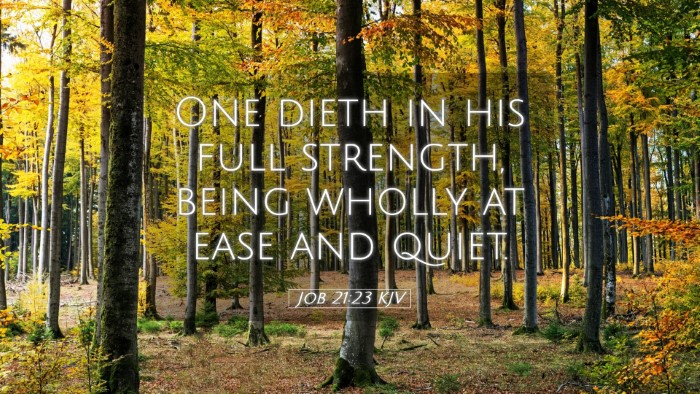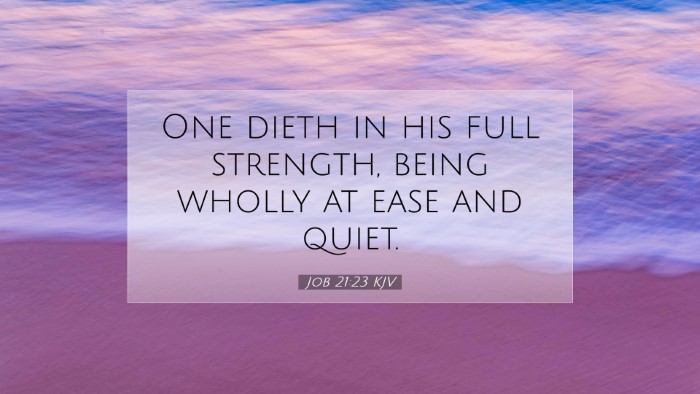Commentary on Job 21:23
Job 21:23 states, "One dies in his full strength, being wholly at ease and secure." This verse encapsulates a profound observation regarding the nature of life, death, and justice, as understood through the lens of Job's discourse on suffering and divine justice.
Contextual Analysis
Within the narrative of the Book of Job, this verse arises during Job’s defense against the assertions of his friends, who insist that suffering is a direct result of sin. Job counters their claims by asserting the apparent prosperity of the wicked, effectively questioning the simplistic correlation between piety and earthly reward.
The Nature of Death
Job observes in this verse the reality that not all individuals who live wickedly face immediate consequences. Job's declaration highlights the experiences of those who, although morally corrupt, live comfortably and die without suffering. This serves to illustrate the complexity of divine justice and suggests a disparity between human perceptions of justice and divine realities.
- Matthew Henry: Henry emphasizes that the death of the wicked in a state of ease contradicts the idea of immediate divine retribution. He interprets this as a challenge to conventional wisdom of the time, which assumed that a good life necessarily leads to a good death.
- Albert Barnes: Barnes further comments on the term "full strength," suggesting that it speaks to the peak of life, a time when individuals typically exhibit vitality and vigor. He highlights that such a realization brings comfort to those who feel persecuted or punished unjustly.
- Adam Clarke: Clarke adds to this that one’s outward condition might not depict one's spiritual state. He notes that earthly tranquility does not guarantee divine favor, thus encouraging a nuanced examination of life's circumstances.
Implications for Understanding Divine Justice
This verse has several implications for contemporary theological discourse concerning divine justice:
- Divine Sovereignty: The verse suggests a broader understanding of God’s sovereignty. While humans may seek to connect suffering and prosperity to sin and righteousness directly, Job’s words communicate that God's plans and justice operate outside human comprehension.
- Moral Complexity: It recognizes the complexity of morality. The presence of those deemed unrighteous experiencing life’s pleasures challenges the simplistic moral order that Job’s friends advocated for and reflects a God who works in mysterious ways.
- Encouragement for Sufferers: This passage offers encouragement to those who suffer, asserting that their suffering does not indicate their standing before God. In highlighting that the wicked may flourish, it reassures the afflicted of their eventual vindication, albeit in a mysterious divine timeline.
Literary Structure and Thematic Elements
The literary structure of Job 21 underscores stark contrasts:
- The juxtaposition of life and death, the righteous and the wicked serves as a vehicle for Job to explore deeper theological questions.
- Job uses vivid imagery to craft a poignant picture of the fate of the wicked, making his argument resonate powerfully with his audience, and effectively challenging their preconceived notions of divine punishment.
Conclusion
In conclusion, Job 21:23 stands as a pivotal verse illustrating the complexities of life, death, and divine justice. Through the insights of Matthew Henry, Albert Barnes, and Adam Clarke, we see the various layers of meaning that provide deeper understanding for pastors, students, and scholars alike. As we consider the serious themes present in this verse, we are reminded that adherence to a moral life does not guarantee an easy or prosperous existence. Instead, we are encouraged to trust in God's justice, which transcends our immediate circumstances and understanding.


